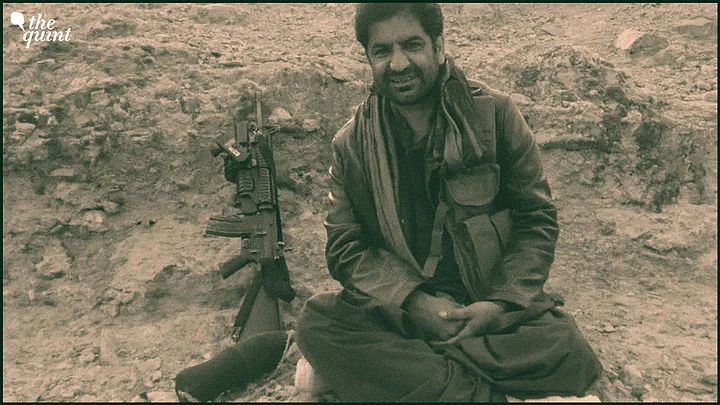“In a high profile and successful Intelligence Operation, Lead Intelligence Agency successfully apprehended a High-Value Target (HVT) Gulzar Imam alias Shambay. He has been a hardcore militant as well as the founder and leader of the banned outfit Baloch National Army (BNA) which came into being after the amalgamation of the Baloch Republican Army (BRA) and United Baloch Army (UBA). BNA had been responsible for dozens of violent terrorist attacks in Pakistan including attacks on Law Enforcement Agencies (LEAs) installations in Panjgur and Noshki.”
This is the media statement published by the Pakistani Inter-Services Public Relations (ISPR) on Friday 7 April 2023, widely circulated across national and international media as TV channels in Pakistan boasted about the 'great results' obtained by both the Army and the Government.
The irony is, and even children in Pakistan know that Gulzar Imam is ISI's 'beloved guest' for almost a year.
Since May 2022, most probably, even though the BNA through BAASK Media, confirmed only in November 2022 that Gulzar was captured, adding that “the organisation is conducting its investigations and it will reach the culprits involved."
There have been lots of speculation on how and where Gulzar was taken. According to some reports, he was lured to Afghanistan where he was captured by Pakistani spy agencies. Another report claimed that he was arrested in Turkey after he arrived there from Iran after having crossed the Pakistan-Iran border. And another rumour said that he had been detained in the Balkan region in a collaborative operation between Pakistani spy agencies and a friendly Muslim nation.
From the Rumour Mill
Almost all the reports, however, talk of betrayal and deception, mentioning various players on the supposed scene of the arrest. Agents in disguise, double or triple agents, or simply, friends and comrades who wanted some reason to get rid of him.
Other reports have been leaking all over this year that Gulzar has most probably been tortured, that Chinese agents have been questioning him, that his family have been taken and was first in Islamabad then taken back to Quetta. Whereas, according to rumors, Gulzar is, currently living in an ISI safe house.
According to other rumors, Gulzar in the past months has been calling, beside his family, friends, and comrades: telling them to come down from the mountains and join him as ISI's guests because the Government was willing to offer benefits to all of them.
'Killing a Leader Will Not Kill the Group'
The fanfare of his arrest, given with no apparent reason yet, is most probably, people say, the prelude to a press conference on any possible media platform: a recorded 'interview' like the one given by Kulbhushan Jadav , a well-orchestrated show for the national and international audience just to demonstrate ISI's narrative.
What neither the Army nor ISI gets is the main point: Imam's detention might have allowed Pakistani agencies to target some facility or to try and disrupt the BNA's network, but at the end of the day will not be relevant or weaken the movement. What ISI and the Pakistani government don't get is that, thanks to their ruthless behaviour towards Balochistan and to the Chinese systematic exploitation of the area, the movement has changed: killing a leader will not kill the group.
The 'new' resistance movement is decentralised, and does not refer anymore to a charismatic leader like it was in the past but, having its core center in the Baloch middle class, spreads now well beyond Pakistan's borders. The current phase of insurgency, the fifth since Pakistan invaded the region, is the longest, most resilient, and most lethal as compared to the previous waves.
Similarly, while autonomy was the main demand in the previous four waves, separatism is the ultimate goal of the current rebellion. For socially resilient insurgent movements, which the current Baloch insurgent wave is, replacing leadership is not an uphill task.
Will the Cycle of Violence Ever stop?
Leaders are no longer indispensable. Over the years, the Baloch have structured their groups in a way which isn't top-heavy. Their strength lies in the narrative which resonates with their supporter base, and agile organisational structures, not their leaders. And for each woman, each child taken, tortured, and killed by the Army known for their excesses, and each Baloch killed abroad like it happened in the past few years, for every activist 'disappeared', more and more people will join the fighters in the mountains.
The Balochistan conflict, of which Pakistan is in a total state of denial, lubricating it under the generic and misleading label of 'terrorism', presently has no solution. Unlike other asymmetrical conflicts in fact, where the insurgent groups use military action to force political negotiations, in this case, due to an endemic (and totally justified from a Baloch point of view) lack of trust, the conflict is only likely to escalate further.
Until Pakistan shows some genuine political will to address the grievances of the Baloch, the political and socio-economic marginalisation of the Baloch will go on unchanged, until the state behaves like an occupation force, baking and supporting also the Chinese occupiers until Balochistan becomes an open prison for its inhabitants and there are 'secret torture cells' around the region ready to host its people, the cycle of violence will go on irrespective of death, captures and detentions of this or that leader.
(Francesca Marino is a journalist and a South Asia expert who has written ‘Apocalypse Pakistan’ with B Natale. Her latest book is ‘Balochistan — Bruised, Battered and Bloodied’. She tweets @francescam63. This is an opinion piece and the views expressed are the author's own. The Quint neither endorses nor is responsible for his reported views.)
(At The Quint, we question everything. Play an active role in shaping our journalism by becoming a member today.)
